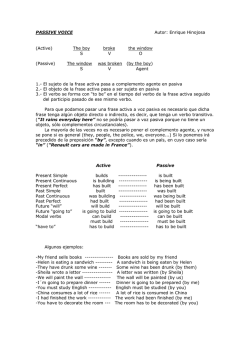
REPORTED SPEECH El Estilo indirecto o Reported speech es una
REPORTED SPEECH El Estilo indirecto o Reported speech es una estructura que se emplea cuando queremos decir o hacer mención sobre algo que alguién ha dicho previamente. Direct speech Reported speech (estilo directo) (estilo indirecto) "I always drink coffee". She said. She said that she always drank coffee. "Yo siempre bebo café." Ella dijo. Ella dijo que ella siempre bebía café. Para hacer mención sobre lo que alguién ha dicho usamos verbos como explain, promise, say, tell, suggest... Aunque los más utilizados son say y tell. Para introducir lo que ha dicho, usamos that aunque muchas veces se puede omitir esta palabra. Al convertir una oración de "Direct Speech" a "Reported Speech" tenemos en cuenta que el verbo principal retrocede un tiempo verbal. Tabla de cambios que sufre el verbo: Direct speech Reported speech present simple I am happy I sleep past simple He said he was happy He said he slept present continuous I am feeling happy I am sleeping past continuous He said he was feeling happy He said he was sleeping past simple I was happy I slept past perfect He said he had been happy He said he had slept present perfect I have been happy I have slept past perfect He said he had been happy He said he had slept present perfect continuous I have been feeling happy I have been sleeping past perfect continuous He said he had been feeling happy He said he had been sleeping future I will be happy I will sleep simple conditional He said he would be happy He said he would sleep future perfect I will have been happy I will have slept simple conditional perfect He said he would have been happy He said he would have slept Verbos modales Direct speech Reported speech CAN I can sleep COULD He said he could sleep MAY I may sleep MIGHT He said he might sleep WILL I will sleep WOULD He said he would sleep MUST I must sleep HAD TO He said he had to sleep Cambios que pueden sufrir algunas partículas de lugar y tiempo: Now at that moment, then tonight that night today that day last night the night before this morning that morning this week that week next week the following week next year the year after here there tomorrow the following day Yesterday the day before These those Reported Speech: questions En las oraciones interrogativas usamos el mismo orden gramatical: el sujeto va después del verbo pero no es necesario usar el auxiliar "do" o "did". Direct speech Reported speech "Where does Susan work? " He asked me where Susan worked. "Do you like London?" He asked me if I liked London. Reported Speech: commands (órdenes) Para dar órdenes usamos el imperativo. Usamos el siguiente orden gramatical: sujeto + verbo + objeto + infinitivo con to. Para negar usamos not antes del infinitivo. Verbos usados para dar ordenes: advise, encourage, invite, persuade, remind, warn. Direct speech Reported speech "Be quiet!" He told them to be quiet. "Don’t forget your wallet" She told him not to forget his wallet. Reported Speech: suggestions Para hacer sugerencias usamos el verbo suggest. Direct speech Reported speech "Shall we go for a walk?" He suggested that they went for a walk. "Why don’t we go out tonight?" She suggested that they went out that night.
© Copyright 2026


